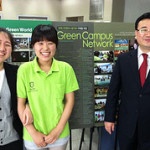We have much more to do and your continued support is needed now more than ever.
South Korea Broadens International Green Campus Movement

What stood out in particular, as a participant, were the level of governmental support demonstrated for greener campuses in Korea, its international approach, the focus on climate change and wildlife sciences, and its large network of energized students.
Government Makes Greener Campuses Priority
The Governors of Gyeonggi-Province and Yongin City and other senior public officials, shared perspectives with attendees on the importance of greener campuses to South Korea and to the larger world. The President of Kangnam University, Yoon Sin-il, highlighted the
“meaningful roles of the green campus movement in assisting with the country’s preparation of environmental policies, sustainable development strategies and measures for addressing climate change.”
Government support has also helped South Korea link to international efforts. Over the past three years, for example, its global green campus forum has brought in university practitioners from at least eleven countries and four continents, including Africa, Asia, Europe and North America.

From Sustainability Curricula to Sacred Forests
Proceedings illustrate various higher education emphases across countries and continents and highlight exemplary programs that might not otherwise be known as widely as deserved, such as Miriam College in the Philippines, in which the faculty and staff take a
“whole-school approach to sustainability education,” according to presenter, Reyett Paunan, “developing sustainability modules for most courses and implementing policies for campus operations, including the recycling of 80% of the campus’ materials stream and green building standards.”
Sonia Koumba Christelle Gerda, from Gabon, meanwhile, described her research efforts at Dalian University of Technology in China, focused on a large-scale urban renewal project in Libreville, Gabon, as well as work to protect and connect the country’s network of thirteen national parks that include biosphere reserves, elephants, and sacred forests.
Low-Carbon Strategies
Green campuses are one of eight national priorities in Korea for addressing climate change science, according to Environment Bureau Director General, Shin-Whoan Park, and also play a role in wildlife and habitat protection and restoration. Professor Si-hu Ju, of Kangnam University, for example, illustrated how the campus is achieving its goals to lead in becoming a low-carbon campus through education for students and staff, a detailed green campus plan with targets and timetables for efficiency and conservation, use of geothermal and other clean energy sources and a recycled water treatment system. The campus also boasts a state-of-the-art resource monitoring and management system designed by Honeywell.
Protecting and restoring wildlife habitat
Green Campus Initiative organizers shared the 2008 report, The Wetlands of Gyeonggi Province, describing Korea’s protection plans and priorities for some 2,000 rivers and streams that provide some of the most important habitats in the world for migratory birds, insectivorous (e.g. carnivorous) plants, and life sustaining water for farmers. Students and faculty, they explained, are key to the research, education and hands-on projects needed to protect and restore these important sanctuaries that hang in the balance as citizens debate the most sustainable approaches to development.
Passionate student leaders for climate solutions

The students supported through these various programs presented about how the hundreds of green projects they have lead to date, all across Korea and beyond, are motivated by the need to find solutions to growing global ecological and social problems. They pass out stickers that encourage “turning off power strips and standby power,” “saving every drop of water” and to “remember the millions of people throughout the world who are suffering from shortage of water and the climate refugees whose homeland is turned into desert.”
Fostering International Linkages
Thank you to Korea’s Gyeonggi-do Association for Green Campus Initiative for the honor of inviting me to present a keynote for this year’s forum about how “Ecologically Literate and Engaged Students will Lead the 21st Century,” as well as to Paul Rowland, executive director of the American Association for Sustainability in Higher Education (AASHE) for connecting Korea’s green campus leadership with National Wildlife Federation’s Campus Ecology Program. It is clear that Korea is working hard to advance green campuses as a national framework for sustainability and, through its higher education leadership and international linkages, is a country to watch as it enlightens the world about what is possible.
Global Green Campus Forum South Korea
Ashwini Srinivasa Presents and Reports on Global Green Campus Forum
Green Campus, Amanda Miu Chung Han, Asia Pacific Business & Technology Report, June 8, 2012





















